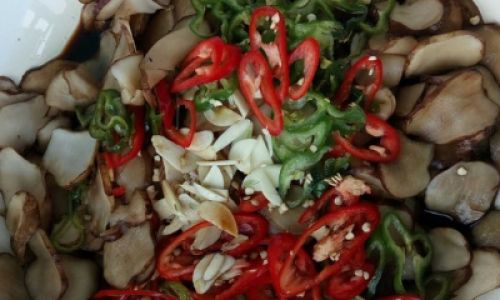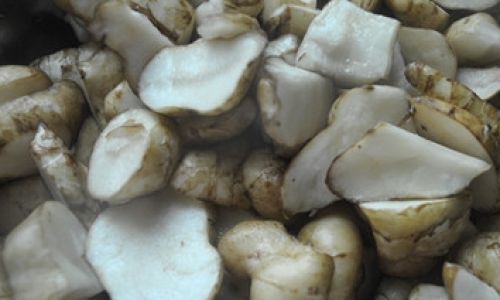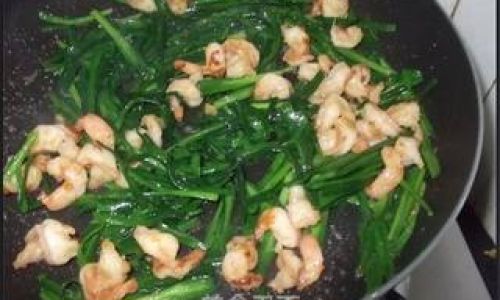Introduction
Jerusalem artichokes, also known as sunchokes or earth apples, are a unique and nutritious root vegetable that offers a delightful, slightly sweet, and nutty flavor. Often overlooked in mainstream cuisine, these tubers can be transformed into a delightful pickled treat that enhances their natural taste and adds a tangy, crunchy element to your meals. Pickling Jerusalem artichokes not only preserves them but also introduces a new dimension of flavor that can be enjoyed throughout the year. In this article, we’ll explore how to pickle Jerusalem artichokes for a taste that is both refreshing and satisfying.
Preparing the Jerusalem Artichokes

Before diving into the pickling process, it’s crucial to prepare the Jerusalem artichokes properly. Start by selecting fresh, firm tubers with smooth, unblemished skin. Avoid those with soft spots, mold, or cracks, as these can harbor bacteria and compromise the pickling process.
-
Cleaning: Rinse the Jerusalem artichokes thoroughly under cold running water to remove any dirt and debris. Use a vegetable brush if necessary to scrub away any stubborn soil.
-
Peeling: While some recipes call for leaving the skin on for added texture and nutrients, peeling can improve the pickling process by ensuring even penetration of the brine. Use a sharp knife or vegetable peeler to remove the thin outer layer.
-
Slicing: Cut the Jerusalem artichokes into uniform slices or small pieces. This not only aids in even pickling but also makes them more pleasant to eat, as larger pieces can be chewy. Aim for slices or cubes that are about 1/4 to 1/2 inch thick.
-
Soaking: To remove excess starch and prevent the pickled artichokes from becoming too slimy, soak the sliced tubers in a bowl of cold water for about 30 minutes. Change the water once or twice during soaking to ensure all starch is removed. Drain well before proceeding.
Making the Pickling Brine
The brine is the key to successful pickling, providing the tangy, acidic flavor that preserves and enhances the Jerusalem artichokes. Here’s a classic brine recipe that balances sweetness, acidity, and saltiness perfectly:

-
Ingredients:
- 2 cups distilled white vinegar (or apple cider vinegar for a milder taste)
- 1 cup water
- 1/2 cup granulated sugar (or honey for a natural sweetness)
- 2 tablespoons pickling salt (or kosher salt)
- 1 teaspoon whole black peppercorns
- 1 teaspoon whole allspice berries
- 1 small cinnamon stick
- 2 cloves
- 1 small onion, thinly sliced (optional for added flavor)
- 1 garlic clove, thinly sliced (optional)
-
Instructions:
- In a medium saucepan, combine the vinegar, water, sugar, and salt. Stir until the sugar and salt are fully dissolved.
- Add the peppercorns, allspice berries, cinnamon stick, and cloves to the saucepan. If using, also add the sliced onion and garlic.
- Bring the mixture to a boil over medium-high heat, then reduce the heat to low and simmer for about 10 minutes to allow the spices to infuse the brine.
- Remove the saucepan from heat and let the brine cool to room temperature. This is important to prevent the Jerusalem artichokes from becoming overly soft during the pickling process.
Pickling the Jerusalem Artichokes
Now that the brine is ready and the Jerusalem artichokes are prepared, it’s time to combine them and start the pickling process.
-
Packing the Jars:
- Sterilize your pickling jars by boiling them in water for about 10 minutes. Let them cool before use.
- Pack the sliced Jerusalem artichokes tightly into the jars, ensuring there are no large air pockets. This helps the brine cover all the pieces evenly.
-
Pouring the Brine:
Carefully pour the cooled brine over the Jerusalem artichokes in the jars, ensuring they are fully submerged. Use a chopstick or small ladle to press down on the tubers if necessary to eliminate any air bubbles.

-
Sealing and Storing:
- Secure the lids tightly on the jars. If using canning jars with two-piece lids, ensure the rubber seals are clean and in good condition.
- Place the jars in a large pot and fill it with enough water to cover the jars by at least 1 inch. Bring the water to a gentle boil and process the jars for about 10 minutes to ensure a safe, sealed pickle.
- Remove the jars from the pot using jar lifters and let them cool on a kitchen towel. Listen for the telltale “ping” sound as the lids seal.
-
Storing:
- Once cooled, check the jars to ensure they are sealed. Any jars that haven’t sealed properly should be refrigerated and used immediately.
- Properly sealed jars can be stored in a cool, dark pantry for up to a year. For best flavor, wait at least a few weeks before opening to allow the flavors to meld.
Serving and Enjoying Pickled Jerusalem Artichokes
Pickled Jerusalem artichokes can be enjoyed in numerous ways. They make a delightful addition to salads, sandwiches, and charcuterie boards, adding a crunchy, tangy contrast to other ingredients. You can also chop them up and use them as a relish for grilled meats, fish, or vegetables. Their unique flavor pairs well with creamy cheeses, mustards, and vinaigrettes.
Conclusion
Pickling Jerusalem artichokes is a simple yet rewarding way to preserve and enjoy this underappreciated vegetable. By following the steps outlined above, you can create a tangy, crunchy treat that will delight your taste buds and provide a versatile ingredient for countless dishes. Whether you’re looking to add a new dimension to your salads or want a unique relish for your favorite meals, pickled Jerusalem artichokes are sure to become a staple in your kitchen. So, why wait? Gather your ingredients, roll up your sleeves, and start pickling today!





0 comments